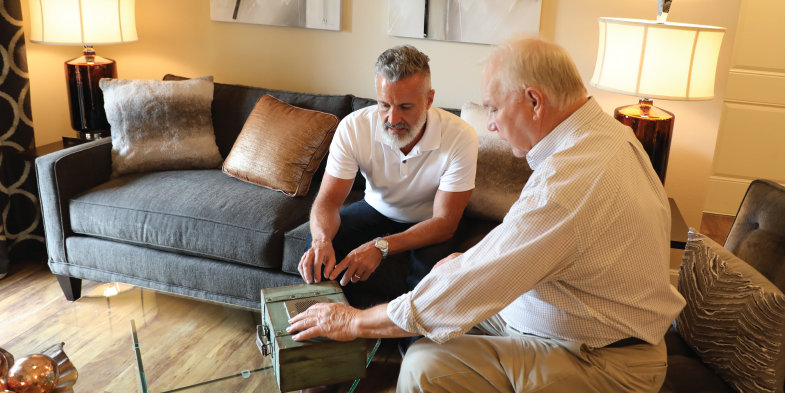GoodLife is always looking for ways to better understand how to train and support our Direct Support Professionals (DSPs) who serve seniors and those with intellectual and developmental disabilities (I/DD). One way we do this is by conducting applied research through the University of Kansas Performance Management Laboratory, directed by Dr. Florence DiGennaro Reed. Rick Shears, GoodLife’s Training Coordinator, shares the types of training GoodLife provides and why this partnership with KU is critical for success.
Rick, what are the three prongs to GoodLife’s training programming?
The three prongs are online training, followed by a five-day in-class pre-service workshop (PSW), and finally on-the-job shadow training. The online training lays a foundation of understanding through 11 modules covering different topics, such as medication passing, driving safety and procedures, and HIPAA and OSHA compliance. PSW builds on this foundation with more in-depth topics: SafetyCare; lifts and transfers; Abuse, Neglect and Exploitation; CPR / First Aid; Behavioral Teaching and Analysis; GoodLife’s mission and ideal outcomes: rapport building, medication management, data collection, and how to use GoodLife iLink technology. Finally, shadow training is two full shifts on the floor of a residential home and includes in-home and day-services training opportunities.
Ultimately, we want our DSPs to feel as prepared as possible to provide the best support possible before they even walk through the door of one of our homes. It’s important they have a strong understanding of the situations that may arise day to day. This mix of training helps us serve the different ways people learn and connect with information.
Tell us more about SafetyCare.
SafetyCare is our crisis management training. The focus of this course is to provide the skills and competencies necessary to effectively prevent, minimize, and manage behavioral challenges with dignity, safety, and the possibility of change. The program is designed to build healthy relationships, focus on an individual’s needs, create a safe and supportive environment, and reinforce desirable behaviors.
Rick, how has GoodLife adapted training during COVID-19?
COVID-19 has changed a lot of things! It’s also given us a unique perspective of our programs to understand what is most effective. To reduce exposure and help protect our many residents with fragile health situations, we shortened the amount of time new staff were in class. We changed in-class training to two-days and eliminated job shadowing, making the bulk of training online. Because the nature of a DSP’s job is situational and relational, we have learned staff don’t feel as equipped with this new format. As we understand more about how we can safely be together, we are reintroducing in-person training to rebalance safety in training with safety within our residential homes.
Why is in-person training so important?
In partnership with KU, we conduct a full day of Behavioral Teaching and Analysis training. Here, KU graduate students spend time discussing topics such as why residents use certain behaviors, how to respond to and redirect a challenging behavior, how to encourage positive behaviors, how to teach residents new skills and independence in the most appropriate manner, and how to control oneself in the face of behaviors. We talk about the psychology of the people we serve and the best ways to support them. Sure, we can cover all of this online, but we have learned that workshopping and practicing different scenarios with real-time feedback and discussion in a classroom is so much more impactful. Since Dr. DiGennaro Reed, her students, and I can’t be in every home all of the time, the greatest thing we can do is train staff with extensive tools to make safe, smart, and caring decisions.
What is unique about how GoodLife trains staff?
Our society tends to undervalue caring for vulnerable populations. At GoodLife, it is the priority. Each component of our training is designed to give our residents the best opportunity to live a full and independent life, to equip and educate caregivers with the tools necessary to support individuals with special needs, and to keep everyone safe—staff included.
GoodLife is incredibly lucky to have KU involved in our workforce development. Dr. DiGennaro Reed’s team provides fresh eyes, so we are continuously evaluating if what we are doing could be done in a better or more effective way. Together, we are training the next generation that will need the skills to deliver care. Plus, my staff is small and so is our capacity. Having access to a team gives us extra hands to develop new training curriculum and materials. Collaboration is vital for GoodLife to be able to grow, expand, and improve how we provide meaningful care to seniors and individuals with I/DD.
Are you interested in making a meaningful difference as part of the GoodLife team? Check out our open positions and help us redefine what’s possible for seniors and people with disabilities.


